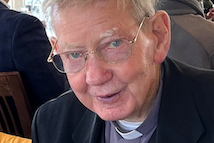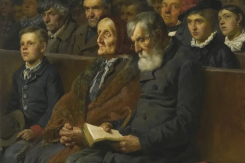Vietnam: hopes fade for return of confiscated church property
Hopes that Catholics in Vietnam might be given back confiscated church properties are fading this week after a top official confirmed that the authorities have no intention of returning them.
Nguyen Thanh Xuan, vice chief of Commission for Religious and Ethnic Affairs said that before the communist takeover of Vietnam, the Church had been such a "grand landlord" that his government, "for the common benefits of people at large, had the right to seize Church properties for good."
He said his government had no intention to return any properties "to the Catholic Church or any other groups of religion".
Xuan's statement on Thursday May 21 in an interview with Radio Free Asia has been viewed by Catholics as a significant turnaround from an earlier government commitment to return some key properties seized for decades back to the Church.
Xuan said the Church had been a "grand landlord" before the communist takeover of North Vietnam in 1954, and later of South Vietnam in 1975. Xuan described the Church as a grand landlord who acquired much of the land to get rich and live luxuriously on the "blood, sweat and tears" of poor tenants.
Fr Joseph Nguyen from Hano, said: i"It's a distortion of history in order to vilify the Church and justify the ongoing injustice of confiscation, persecution, oppression, and exclusion.
"Most of 2250 Church properties seized by the government were buildings the Church used for worshipping, education, or various charitable activities including hospitals to provide health care for the poor," he continued.
"Up to 1962, Vietnam had been a missionary country in which foreign missionaries and local clergy mobilized all means available to them for serving the poor and through their charitable activities set themselves as true witnesses of the Gospel which they wanted to proclaimed. The Church in Vietnam has never used its land as a financial resource or to live luxuriously. In fact, the Church in Vietnam has not been profited from renting or selling of any piece of properties in dispute. The term 'Địa Chủ Nhà Chung' is therefore an insult - a crass, immoral insult - to the Church and Vietnamese Catholics," he added.
"Labeling Catholic leaders as landlords was a tactic frequently used by Vietnam government in the 1950s to seize Church properties, terrorize bishops, priests, religious and faithful, and ultimately alienate them from the public. In the land reform campaign which spread to most of the villages of North Vietnam from mid-1955 to mid-1956, many Catholic leaders were falsely labeled as landlords and subjected to the confiscation of their land and overt persecution. In an official document, the government reported that the land reform campaign was conducted at 3,563 villages with more than half a million people charged as landlords. Among them 172,008 were executed. In the same document, Vietnam government admitted that among those who were killed, 123,226 were actually victims of injustice. A significant number of priests and lay leaders were murdered in this campaign, resulting in so many congregations without Mass and sacraments for decades.
"Many buildings that once belonged to the Church have been administered by the State on the grounds that they were needed for social purposes. Even when their purposes are no longer met, the buildings are seldom returned to their owners," Fr. Joseph Nguyen accused. "Very often, Church properties have been used either to award government officials, or to produce financial support for the Party," he said.
"If this government has really cared for 'the common benefits of people at large', why did high ranking officials seize large lots of land, and key buildings in large cities then later used them for personal investment?", he asked.
"Just because of the common benefits of people at large, the Church has demanded that its properties must be returned to it so that they can be used to serve the society, not the Party," elaborated Sr. Marie Nguyen from Saigon.
Xuan's statement reflects a flip-flop in Vietnam religious policy. In a meeting of the committee of Catholic union - which is part of the Patriotic Front - held on February 27 last year, expressing the prime minister's point of view on the matter, Tran Dinh Phung, a permanent member of the Front and the head of Commission for Religious and Ethnic affairs described as "totally legitimate" the Church's request to be allowed to use the complex for the activities of the bishops' conference. "The government cannot ignore the request from the highest leadership of 7 million Vietnamese Catholics, which for 27 years - since the formation of the bishops' conference - has been collaborating with the nation. For this reason, the prime minister has entrusted the examination of the question to the office of religious affairs, to the competent ministers, and to the people's committee of Hanoi."
Seven months after his promise, on 19 September 2008, before daybreak, while the residents of Nha Chung St in Hanoi were still asleep, hundreds of police gathered in front of the house of Archbishop Joseph Ngo Quang Kiet. They set up roadblocks and barbed wire, denying access to the archbishop's residence, to St Joseph's Cathedral and to all roads leading to the former nunciature nearby. Police dogs were brought in to help isolate the area and make sure no one got in or out. Blocking devices were in evidence, preventing communication by mobile phone or any other means between the district and the outside world. When it was light, bulldozers moved on to the site of the former nunciature, and construction workers and hundreds of police began demolishing the buildings on the site. As the cathedral's bells started ringing to alert and summon parishioners, state-controlled television and radio announced that the Government had decided to demolish the buildings to make room for a public playground.


















